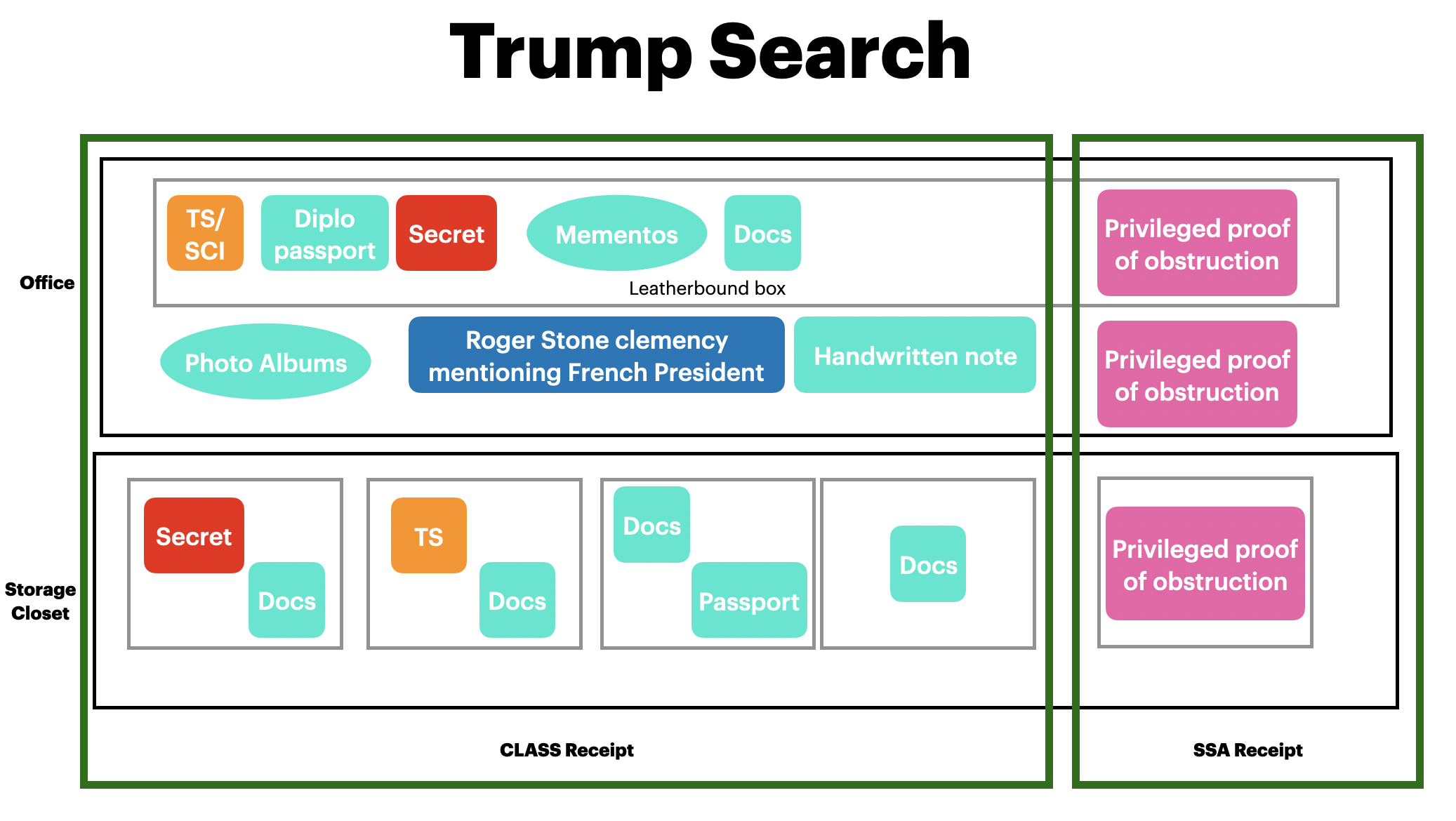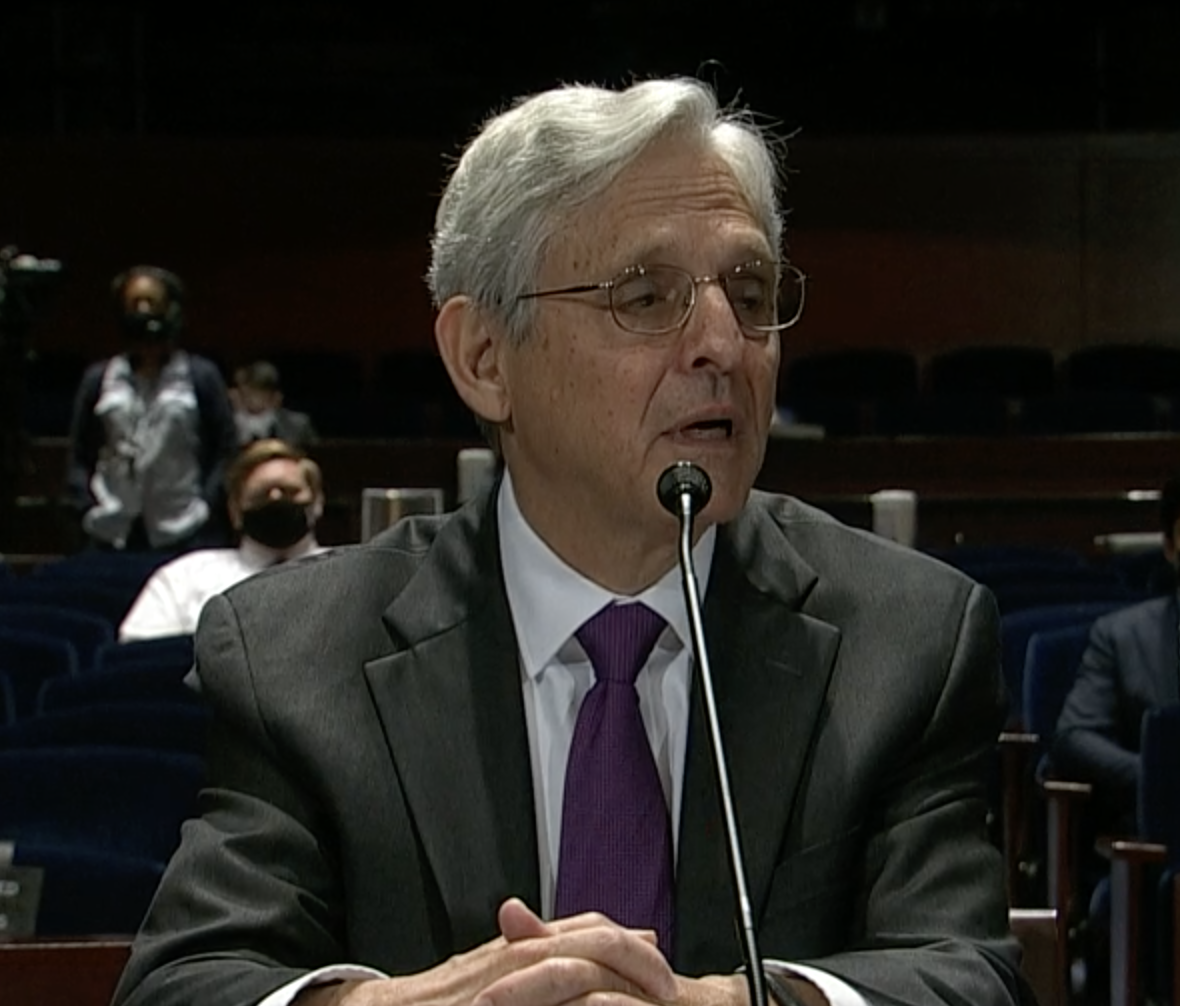Mastering Obstruction: Two of Trump’s Attorneys May Be Witnesses or Suspects
NYT published a 1,700-word story on the investigation into Donald Trump that didn’t include the word “obstruction” once. It implied (though the reporting wasn’t entirely clear) that the government has already found about a hundred additional classified documents among the boxes seized on August 8, on top of around 200 already identified from the boxes turned over in January and the meeting with Jay Bratt on June 3.
WaPo published a 2,100-word story on the investigation that likewise failed to mention that “obstruction” was one of the crimes for which DOJ believed they’d find evidence at Mar-a-Lago. The WaPo story treated the ridiculous filing Trump’s attorneys, including Evan Corcoran, submitted yesterday as if it were a serious legal endeavor.
You cannot understand several of the things that appear in these stories without considering the legal import of the fact that after Corcoran and Christina Bobb (who is described alternately in Trump’s filing as, on page 5, the custodian of records and, on page 8, as one of “three attorneys in the general area” who showed up to observe the search) jointly signed a declaration stating that there were no more classified documents at Mar-a-Lago, the FBI found 100 more classified documents at Mar-a-Lago.
Here’s how the NYT story described it.
On June 3, Jay Bratt, the chief of the counterespionage section of the national security division of the Justice Department, went to Mar-a-Lago to meet with two of Mr. Trump’s lawyers, Evan Corcoran and Christina Bobb, and retrieve any remaining classified material to satisfy the subpoena. Mr. Corcoran went through the boxes himself to identify classified material beforehand, according to two people familiar with his efforts.
Mr. Corcoran showed Mr. Bratt the basement storage room where, he said, the remaining material had been kept.
Mr. Trump briefly came to see the investigators during the visit.
Mr. Bratt and the agents who joined him were given a sheaf of classified material, according to two people familiar with the meeting. Mr. Corcoran then drafted a statement, which Ms. Bobb, who is said to be the custodian of the documents, signed. It asserted that, to the best of her knowledge, all classified material that was there had been returned, according to two people familiar with the statement.
Since Corcoran and Bobb created that declaration, and particularly since FBI seized evidence proving it was not true, they became likely witnesses or co-conspirators in this investigation, both in the obstruction side of the investigation (because they might know whether classified documents were deliberately hidden for Bratt’s visit and who knew that declaration to be a lie) and the Espionage Act side (because 18 USC 793 has a conspiracy provision).
So when Bobb arrived during the search on August 8 and “requested the ability to enter the mansion in order to observe what the FBI agents were doing,” the FBI would have viewed her as a potential co-conspirator in obstruction of an Espionage Act investigation.
And when Corcoran signed a filing demanding that the Court (a different court than the one that approved the warrant) appoint a Special Master who will work with lawyers from both sides to review the documents and also demanding that he and Trump’s other lawyers get a detailed list of what was seized, the FBI would view him as a potential co-conspirator in obstruction of an Espionage Act investigation.
Movant requests that this Court appoint a Special Master pursuant to Rule 53(a)(1)(B) of the Federal Rules of Civil Procedure and this Court’s inherent equitable powers and authority. This step — which the Government itself has requested in cases involving the seizure of privileged and/or potentially privileged materials — is needed to preserve the sanctity of executive communications and otherprivileged materials. Furthermore, Movant requests that this Court issue a protective order enjoining the United States from any further review of the items seized until this Court can rule on the present Motion. See Fed.R.Civ.P.26(b)(5)& (c) (1); S.D.Fla.L.R.26.l(g).
In addition, Movant requests that this Court direct the United States to prepare and provide a specific and detailed Receipt for Property. See Fed.R.Crim.P.41(f). The Receipt For Property” provided to Movant on August 8, 2022 is so vague and lacking in specificity that the reader does not know what was seized from Movant’s home.
Indeed, one likely goal of this filing is to get a different judge — one who doesn’t know whether Corcoran is named as a suspect on the affidavit — to force DOJ to tell everyone whether he is or not.
One reason the FBI asked for more surveillance footage — which the NYT story that doesn’t mention obstruction says is part of the hunt for more classified documents — is because they need to understand who caused that false filing to be filed in June and what happened in the storage area between Bratt’s visit and the search.
Even after the extraordinary decision by the F.B.I. to execute a search warrant at Mar-a-Lago on Aug. 8, investigators have sought additional surveillance footage from the club, people familiar with the matter said.
It was the second such demand for the club’s security tapes, said the people familiar with the matter, and underscored that authorities are still scrutinizing how the classified documents were handled by Mr. Trump and his staff before the search.
It remains true that we have no idea how narrowly or broadly the FBI scoped the probable cause of obstruction in the warrant affidavit. But what is clear is that DOJ will view both Bobb and Corcoran — the latter of whom remains one of the lawyers in closest contact with Bratt and who is the person who issued what has been viewed as a veiled threat to Merrick Garland — as either witnesses or subjects in this investigation.
And you really can’t explain the significance of that without using the word “obstruction.”
emptywheel Trump Espionage coverage
Mastering Obstruction: Two of Trump’s Attorneys May Be Witnesses or Suspects
Archives Letter Demonstrates Import of Past Kash Patel Claim of Declassification
Trump’s Reneges on Promised Significant Fourth Amendment Filing
Next Steps in the Trump Stolen Documents Investigation
Maggie Haberman: Heads It’s Only Obstruction, Tails It’s Not Obstruction
The French President May Be Contained Inside the Roger Stone Clemency
Which of the Many Investigations Trump Has Obstructed Is DOJ Investigating?
The Known and Likely Content of Trump’s Search Warrant
The ABCs (and Provisions e, f, and g) of the Espionage Act
Trump’s Latest Tirade Proves Any Temporary Restraining Order May Come Too Late
How Trump’s Search Worked, with Nifty Graphic
Pat Philbin Knows Why the Bodies Are Buried
Trump’s Timid (Non-Legal) Complaints about Attorney-Client Privilege
18 USC 793e in the Time of Shadow Brokers and Donald Trump
[from Rayne] Other Possible Classified Materials in Trump’s Safe
John Solomon and Kash Patel May Be Implicated in the FBI’s Trump-Related Espionage Act Investigation
[from Peterr] Merrick Garland Preaches to an Overseas Audience
Three Ways Merrick Garland and DOJ Spoke of Trump as if He Might Be Indicted
The Legal and Political Significance of Nuclear Document[s] Trump Is Suspected to Have Stolen
Merrick Garland Calls Trump’s Bluff
[from Rayne] Expected Response is Expected: Trump and Right-Wing DARVO
DOJ’s June Mar-a-Lago Trip Helps Prove 18 USC 793e
The Likely Content of a Trump Search Affidavit
Some Likely Exacerbating Factors that Would Contribute to a Trump Search
FBI Executes a Search Warrant at 1100 S Ocean Blvd, Palm Beach, FL 33480



